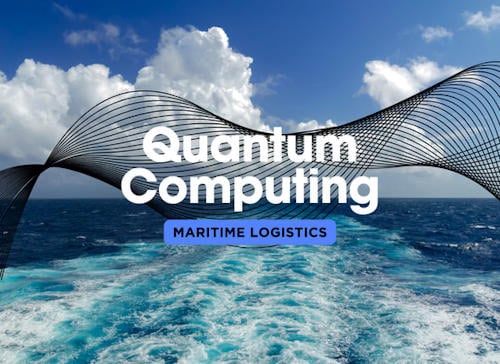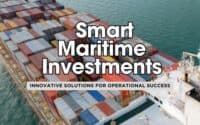Quantum Computing: Revolutionizing Maritime Logistics for the Future

Quantum computing, a cutting-edge technological advancement, promises to revolutionize industries by solving complex problems far more efficiently than classical computing. At its core, quantum computing leverages the unique properties of quantum bits (qubits), which can exist in multiple states simultaneously (superposition) and influence each other instantly across distances (entanglement). This capability allows quantum computers to process vast amounts of data at unprecedented speeds, tackling intricate problems that classical computers struggle to solve. In the realm of maritime logistics, where the efficient coordination of vessel scheduling, cargo handling, and supply chain management is paramount, quantum computing's potential is immense. By optimizing complex routing problems, enhancing supply chain operations, and providing real-time data analysis, quantum computing could significantly reduce operational costs and improve efficiency, heralding a new era of innovation in maritime logistics.
| ShipUniverse: Quantum Computing Compare | ||
|---|---|---|
| Aspect | Classical Computing | Quantum Computing |
| Processing Power | Uses bits (0 or 1); linear processing | Uses qubits; exponential processing through superposition |
| Problem-Solving Capabilities | Effective for simple, sequential tasks | Excels at complex problems like optimization and cryptography |
| Speed and Efficiency | Slower for large-scale data analysis | Significantly faster for certain applications |
| Route Optimization | Limited by classical algorithms | Can process large datasets rapidly and dynamically |
| Supply Chain Management | Challenges in handling complex data | Enhances demand forecasting and inventory management |
| Predictive Maintenance | Less accurate predictive analytics | More accurate maintenance predictions, reducing downtime |
| Data Security | Vulnerable to certain types of cyber-attacks | Provides advanced encryption for enhanced security |
Understanding Quantum Computing
Quantum computing represents a monumental leap in computational technology, offering capabilities far beyond those of classical computers. By leveraging the unique properties of quantum bits, or qubits, quantum computing can process vast amounts of data simultaneously, solving complex problems with unprecedented speed and efficiency. This section delves into the fundamental concepts of quantum computing, exploring the principles of superposition and entanglement, and highlighting key differences from classical computing.
Basic Concepts
Qubits and Superposition
- Qubits: The fundamental unit of quantum computing, analogous to bits in classical computing.
- Superposition: Qubits can exist in multiple states (0 and 1) simultaneously, allowing quantum computers to perform many calculations at once.
Entanglement and Quantum Gates
- Entanglement: When qubits become entangled, the state of one qubit instantly influences another, regardless of distance.
- Quantum Gates: The building blocks of quantum circuits, manipulating qubits to perform complex operations that classical logic gates cannot.
Quantum Algorithms
- Shor's Algorithm: Exponentially faster at factorizing large numbers, posing significant implications for cryptography.
- Grover's Algorithm: Provides a quadratic speedup for unstructured search problems, enhancing database searches and optimization tasks.
Key Differences from Classical Computing
Quantum computing stands apart from classical computing primarily in its processing power and efficiency.
Processing Power
- Classical Computers: Process information using bits that are either 0 or 1.
- Quantum Computers: Use qubits that can process multiple possibilities simultaneously through superposition, leading to exponential increases in computational power.
Problem-Solving Capabilities
- Quantum computers excel at solving optimization problems, cryptography, and large-scale data analysis.
- They can evaluate many potential solutions at once, identifying the most efficient outcomes rapidly.
Speed and Efficiency
- Quantum algorithms can outperform classical algorithms in specific applications.
- This reduces the time and resources required for data processing and problem-solving, making quantum computing ideal for industries requiring extensive computational power.
Potential Applications in Maritime Logistics
Quantum computing has the potential to revolutionize maritime logistics by addressing key challenges in the industry.
Enhanced Route Optimization
- Real-Time Data Analysis: Quantum computing can process large datasets rapidly, providing dynamic route adjustments.
- Cost and Time Savings: By evaluating numerous scenarios simultaneously, quantum algorithms can identify the most efficient paths, reducing fuel consumption, transit times, and operational costs.
Improved Supply Chain Management
- Advanced Demand Forecasting: Quantum algorithms can analyze complex market data to predict demand more accurately, helping to maintain optimal inventory levels and reducing the risk of stockouts or overstocking.
- Streamlined Coordination: Enhances communication and synchronization across the supply chain, improving overall efficiency and reducing delays.
Predictive Maintenance
- Enhanced Predictive Analytics: Quantum computing can analyze performance data to predict maintenance needs more accurately, reducing unscheduled downtime and extending the lifespan of equipment.
- Operational Efficiency: Ensures vessels and equipment are maintained in optimal condition, minimizing disruptions and operational costs.
Data Security
- Quantum Encryption: Offers unprecedented levels of data security, ensuring secure communication and data exchange between stakeholders.
- Protection Against Cyber Threats: Enhances the resilience of maritime logistics against cyber-attacks and data breaches.
Current State of Maritime Logistics
Maritime logistics is the backbone of global trade, involving the intricate coordination of shipping routes, port operations, and supply chain management. Despite the advancements in technology, the industry still faces significant challenges such as route optimization, inventory management, and predictive maintenance. This section provides an overview of the current state of maritime logistics, identifying the key components, stakeholders, and technologies in use, as well as the limitations and inefficiencies that persist.
Overview of Maritime Logistics and Supply Chain Management
Key Components and Stakeholders
- Shipping Companies: Own and operate vessels that transport goods globally. They manage fleets, crews, and cargo.
- Port Authorities: Oversee port operations, including the loading and unloading of cargo, ensuring efficient and secure handling.
- Freight Forwarders: Coordinate the transportation of goods from origin to destination, handling logistics, documentation, and customs clearance.
- Suppliers and Manufacturers: Produce and provide goods that are transported via maritime routes, relying on efficient shipping logistics to maintain supply chains.
- Customers: End recipients of goods, ranging from businesses to individual consumers, expecting timely and reliable delivery of products.
Current Technologies in Use
- GPS and AIS Systems: Provide real-time tracking and positioning of vessels, enhancing navigation and route planning.
- Electronic Data Interchange (EDI): Facilitates the exchange of documents and information between stakeholders, streamlining customs processes and reducing paperwork.
- Warehouse Management Systems (WMS): Optimize storage, inventory management, and order fulfillment, improving efficiency and reducing costs.
- Automated Terminals: Utilize robotics and automation to handle cargo at ports, increasing the speed and accuracy of loading and unloading operations.
Challenges and Limitations
Route Optimization
- Variable Factors: Shipping routes must account for weather conditions, fuel consumption, port congestion, and regulatory constraints.
- Traditional Algorithms: Struggle to process the vast amount of data and dynamic variables involved, often resulting in suboptimal routing decisions and increased operational costs.
Inventory Management
- Demand Forecasting: Requires accurate prediction of market demand to avoid overstocking or stockouts. Traditional methods may not adequately handle the complexities of global supply chains.
- Coordination with Multiple Stakeholders: Involves synchronizing operations across suppliers, manufacturers, and distributors. Miscommunication and delays can disrupt the entire supply chain.
Predictive Maintenance
- Data Handling and Processing: Requires real-time monitoring and analysis of equipment performance data. Traditional systems may not efficiently handle the volume and complexity of data.
- Unscheduled Downtime: Can lead to significant operational costs and delays. Predictive maintenance aims to anticipate issues before they cause failures, but existing methods may fall short.
Potential Transformative Impact of Quantum Computing
Enhanced Route Optimization
- Real-Time Data Analysis: Quantum computing can process large datasets rapidly, allowing for dynamic route adjustments.
- Cost and Time Savings: Quantum algorithms can evaluate numerous routing scenarios simultaneously, identifying the most efficient paths in real-time, leading to significant fuel and time savings.
Improved Supply Chain Management
- Advanced Demand Forecasting: Quantum algorithms can analyze complex market data to predict demand more accurately, helping to maintain optimal inventory levels and reducing the risk of stockouts or overstocking.
- Streamlined Coordination: Enhances communication and synchronization across the supply chain, improving overall efficiency and reducing delays.
Predictive Maintenance
- Enhanced Predictive Analytics: Quantum computing can analyze performance data to predict maintenance needs more accurately, reducing unscheduled downtime and extending the lifespan of equipment.
- Operational Efficiency: Ensures vessels and equipment are maintained in optimal condition, minimizing disruptions and operational costs.
Data Security
- Quantum Encryption: Provides unprecedented levels of data security, ensuring secure communication and data exchange between stakeholders.
- Protection Against Cyber Threats: Enhances the resilience of maritime logistics against cyber-attacks and data breaches.
Quantum computing's potential to revolutionize maritime logistics is immense. By addressing current challenges in routing, supply chain management, predictive maintenance, and data security, quantum computing can lead to significant cost savings, improved efficiency, and enhanced competitiveness in the global market.
Quantum Computing Applications in Maritime Logistics
The integration of quantum computing into maritime logistics promises to address many of the industry's longstanding challenges. By enhancing route optimization, improving supply chain management, and providing advanced predictive maintenance, quantum computing can revolutionize how maritime operations are conducted. This section explores specific applications of quantum computing in the maritime sector, illustrating its potential to transform the industry through increased efficiency, cost savings, and enhanced security.
Optimizing Complex Routing Problems
Quantum computing offers revolutionary advancements in optimizing complex routing problems, a persistent challenge in maritime logistics.
Real-Time Route Adjustments
- Dynamic Variables: Traditional algorithms struggle with the dynamic nature of variables such as weather conditions, port congestion, and fuel consumption.
- Quantum Solutions: Quantum computers can process and analyze vast amounts of real-time data, allowing for immediate adjustments to shipping routes.
- Efficiency Gains: This capability leads to more efficient routes, reducing transit times and fuel costs.
Scalability and Complexity
- Large Data Sets: Quantum algorithms can handle extensive data sets far more efficiently than classical methods.
- Complex Scenarios: They can evaluate multiple routing scenarios simultaneously, identifying the optimal path in a fraction of the time required by classical computers.
Supply Chain Management
Quantum computing's potential to enhance supply chain management is significant, particularly in areas requiring high levels of data processing and predictive analytics.
Inventory Optimization
- Accurate Forecasting: Quantum algorithms improve demand forecasting by analyzing complex market data and trends more accurately.
- Inventory Levels: This leads to better inventory management, reducing the risks of stockouts and overstocking.
Coordination and Communication
- Stakeholder Synchronization: Quantum computing enhances the coordination between suppliers, manufacturers, and distributors.
- Streamlined Operations: Improved synchronization reduces delays and ensures a more efficient flow of goods through the supply chain.
Enhancing Predictive Maintenance
Predictive maintenance is crucial for minimizing unscheduled downtime and extending the lifespan of maritime equipment.
Predictive Analytics
- Data Processing: Quantum computing can analyze vast amounts of performance data to predict maintenance needs more accurately.
- Anticipating Failures: This reduces the likelihood of unexpected equipment failures, allowing for timely interventions.
Operational Cost Reduction
- Efficiency Gains: Enhanced predictive maintenance ensures that vessels and equipment are maintained optimally, reducing operational disruptions.
- Cost Savings: Minimizing unscheduled downtime translates into significant cost savings and improved operational efficiency.
Improving Data Security
Data security is a paramount concern in maritime logistics, and quantum computing offers robust solutions.
Quantum Encryption
- Secure Communication: Quantum encryption techniques provide unprecedented levels of data security, ensuring that communications between vessels, ports, and other stakeholders are secure.
- Cyber Threat Protection: Enhanced security measures protect against cyber-attacks and data breaches, safeguarding sensitive information.
Resilience and Trust
- Industry Confidence: The implementation of quantum encryption builds trust among stakeholders, knowing that their data and communications are secure.
- Long-Term Benefits: Investing in quantum security measures enhances the overall resilience of maritime logistics operations against emerging cyber threats.
By leveraging the unique capabilities of quantum computing, the maritime logistics industry can address some of its most pressing challenges. From optimizing complex routing problems and improving supply chain management to enhancing predictive maintenance and strengthening data security, quantum computing has the potential to transform maritime logistics, leading to significant cost savings, improved efficiency, and enhanced competitiveness in the global market.
Challenges and Considerations
While the potential benefits of quantum computing in maritime logistics are immense, the path to integration is fraught with challenges. Technical limitations, high costs, and regulatory issues must be navigated carefully to realize these advancements. This section examines the practical, economic, and ethical considerations involved in adopting quantum computing technology, providing a balanced view of the obstacles that need to be overcome and the strategies for successful implementation.
Technical and Practical Challenges
Current Limitations of Quantum Hardware
- Development Stage: Quantum computing is still in its nascent stages, with many technological hurdles to overcome.
- Error Rates: Quantum systems currently have high error rates, which can affect the accuracy and reliability of computations.
- Scalability: Building and maintaining a large-scale quantum computer is a complex and costly endeavor.
Integration with Existing Systems
- Compatibility Issues: Integrating quantum computing with existing classical computing systems in maritime logistics can be challenging.
- Hybrid Solutions: Developing hybrid solutions that combine classical and quantum computing capabilities might be necessary in the short term.
- Training and Expertise: There is a need for specialized knowledge and training to effectively implement and manage quantum computing technologies.
Economic and Financial Considerations
Cost of Quantum Computing Resources
- High Initial Investment: The cost of developing and deploying quantum computing infrastructure can be prohibitively high.
- Return on Investment (ROI): Assessing the ROI of quantum computing investments requires careful consideration of potential long-term benefits versus upfront costs.
ROI and Cost-Benefit Analysis
- Potential Savings: While the initial investment is high, the potential savings in terms of operational efficiency and cost reductions can be significant.
- Risk Assessment: Companies need to conduct thorough risk assessments and cost-benefit analyses before committing to quantum computing solutions.
Regulatory and Ethical Issues
Compliance with International Regulations
- Maritime Laws: Ensuring compliance with international maritime laws and regulations is crucial when implementing new technologies.
- Data Privacy: Quantum computing must adhere to strict data privacy regulations to protect sensitive information.
Ethical Considerations in Data Handling
- Data Security: Quantum encryption must ensure the highest standards of data security to prevent misuse of information.
- Ethical Use: The ethical use of quantum computing in maritime logistics should be monitored to prevent any potential negative impacts on employment and industry practices.
Quantum computing represents a transformative opportunity for the maritime logistics industry, offering solutions to some of its most complex and pressing challenges. By harnessing the power of qubits, superposition, and entanglement, maritime logistics can achieve new levels of efficiency, security, and cost-effectiveness. However, the journey towards fully integrating quantum computing into maritime logistics comes with its own set of challenges, including technological, economic, and regulatory hurdles. As the technology continues to mature, stakeholders in the maritime industry must carefully weigh the potential benefits against these challenges. With strategic investment and thoughtful implementation, quantum computing has the potential to revolutionize maritime logistics, paving the way for a more efficient, secure, and competitive global shipping industry.

Do you have a Maritime Product or Service that may be of interest to Shipowners? Tell us about it here!
Do you have feedback or insights? Please reach out to editor @ shipuniverse.com



